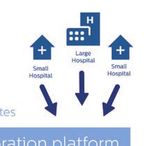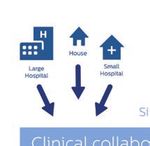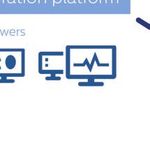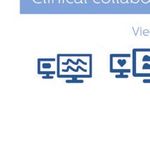Consolidate data with Enterprise Repository - Philips
←
→
Page content transcription
If your browser does not render page correctly, please read the page content below
Real-time access, virtually anywhere
The larger healthcare enterprises become, the more their enormous compilation of patient
images and data becomes isolated in individual, incompatible departmental archives. This
data is generally stored in multiple formats across disparate vendors, making accessing and
sharing data efficiently next to impossible. They also impede workflow and drive up costs.
Is your data stranded on separate storage islands?
Many growing enterprises are facing this issue – leading them to set a number of critical objectives. They urgently need to:
• Federate or consolidate all existing archives of clinical imaging data in a single repository.
• Develop a smooth and highly effective process for migration that ensures uninterrupted end-user access.
• Store proprietary data in standards-based formats – to allow across-the-board access and sharing.
• Incorporate and acquire data from mobile devices, securely and with data management.
• Achieve full hardware-platform independence.
• Provide high SLA with comprehensive business-continuity and disaster-recovery options.
• Give physicians the ability to access each patient’s complete record and review data along the entire clinical pathway.
A standards-based solution
The Clinical Repository module of the clinical collaboration “When an enterprise is struggling with
platform can help facilities address all of the these the effects of siloed data Philips’ clinical
challenges. It enables archiving of and access to clinically
collaboration platform is the ideal way
meaningful data, with intelligent lifecycle management
across each patient’s entire clinical journey. Our vendor- to achieve consolidation, increased
neutral archive module integrates data from existing productivity and improved patient care”.
systems within the Unified Core of the platform – and
makes the data easily accessible to all authorized Elad Benjamin
stakeholders throughout the enterprise. Vice President Radiology Informatics
Workflow Clinical Diagnostic Image Analytics
management repository sharing
Want to learn more? Explore all the benefits and learn how to put the platform to work for you at:
www.philips.com/collaborationCase Study
A major health plan enterprise. California, USA
Improving data-management efficiency.
The dramatic upsurge in connectivity, communication and collaboration enabled by the
Enterprise Repository Solution can elevate performance in every area of the enterprise.
1. More Efficient Processes: The platform vastly simplifies IT governance, permitting facilities to
9
dene enterprise processes to control security and manage data created in the departments.
2. Enhanced Time- and Cost-savings: The Enterprise Repository enables a holistic view of data
Health Systems
for clinicians – and ensures that images are available precisely when needed.
3. Increased Revenues: A common repository enables facilities to create “pathway strategies”
that enable them to provide dedicated, multi-disciplinary journeys (oncology, neurology, etc.)
4. More Valuable Information: The platform offers advanced analytics that can enable enterprises
to optimize their workflows and processes and retrieve valuable information from all of their
archived digital images.
The challenges
One of the largest not-for-profit health plans in the USA, serving regions from the Mid-Atlantic
8.5M+
Patients/year
to California, was struggling with the many drawbacks of separate archives and siloed data. Their
challenge was to create a single patient record and repository to share across sites, and enable
access to patient-centric data storage from any site, allowing optimal management of images and
data from cardiology, radiology and dermatology.
The solution
Implemented Philips’ clinical collaboration platform with Enterprise Vendor-Neutral Archive
and Enterprise Viewer to replace a legacy archive consolidate multiple sources into a single
patient repository. 18K
Clinicians/day
1. Philips’ Enterprise Repository VNA module seamlessly consolidates disparate imaging
systems into one repository using the latest interoperability standards.
2. Philips’ vendor-neutral, zero-footprint Enterprise Viewer module provides secure, real-time
image access across the healthcare enterprise.
The results
Improved workflow and an elevated standard of care, as stakeholders at all of the enterprise’s
geographic sites became able to access full patient records using their solution of preference.
Physicians can now access patient information while maintaining the data integrity of each system.
10M+
Exams/year
Results are specific to the institution where they were obtained and may not reflect the results achievable at other institutions.A closer look
We’ll support you every step of the way
Implementing an Enterprise Imaging platform strategy is a complex process, as many issues must be addressed
simultaneously. One example is the need to integrate the workflow of multiple departments with different requirements,
file formats and specific, advanced clinical software. The governance of the project is crucial, and keeping an enterprise-
wide strategy approach is key.
Implementation process
The process would proceed as follows:
• Philips assigns a team led by a Project Manager
with a Solution Architect responsible for the
solution design. Technical-implementation
Specialists address the installation and
configuration and Application Consultants dene
the workflow and educate the users about the new
interfaces. An Integration Specialist will address all
the interfaces for back-end and front-end.
• Clinical collaboration platform is installed in the
central hub and the Enterprise Repository module
is activated. Unified Core interfaces (DICOM, HL7,
XDS, PIX) are configured to integrate the back-end
to the hospital information system. • At this point, the platform’s Enterprise Repository module is
• In the meantime, the analysis of the departments ready to capture data in mobility (smartphone and tablets),
is started in order to design the right framework store structured and unstructured data (DICOM, XDS, JPEG,
to support the enterprise imaging strategy. MP4, PDF, etc.) and eventually review the imaging with the
Enterprise Viewer module.
• The Integration Specialist will develop the
interfaces for the department data sources, • Optionally, Clinical Diagnostic clients can be web-deployed.
and the Technical-implementation Specialist • All users will gain a global view of all imaging, loading images
will configure and test the archive of the different and data via smart tunneling and streaming capabilities –
object types. allowing extremely fast loading, even with poor bandwidth.
Connecting people and data, virtually anywhere
Philips’ clinical collaboration platform
establishes an interoperable clinical data
ecosystem – connecting professionals
with the imaging data they need across
the continuum of care. This modular,
multi-site, multidomain standards-based
Enterprise Imaging solution enables real-
time, on-demand access to holistic clinical
data for those involved in the care journey,
including the patients.© 2020 Koninklijke Philips N.V. All rights reserved. Philips Healthcare Information Solutions (formerly a Carestream Health business). CARESTREAM is a trademark of Carestream Health. www.philips.com/collaboration
You can also read



























































